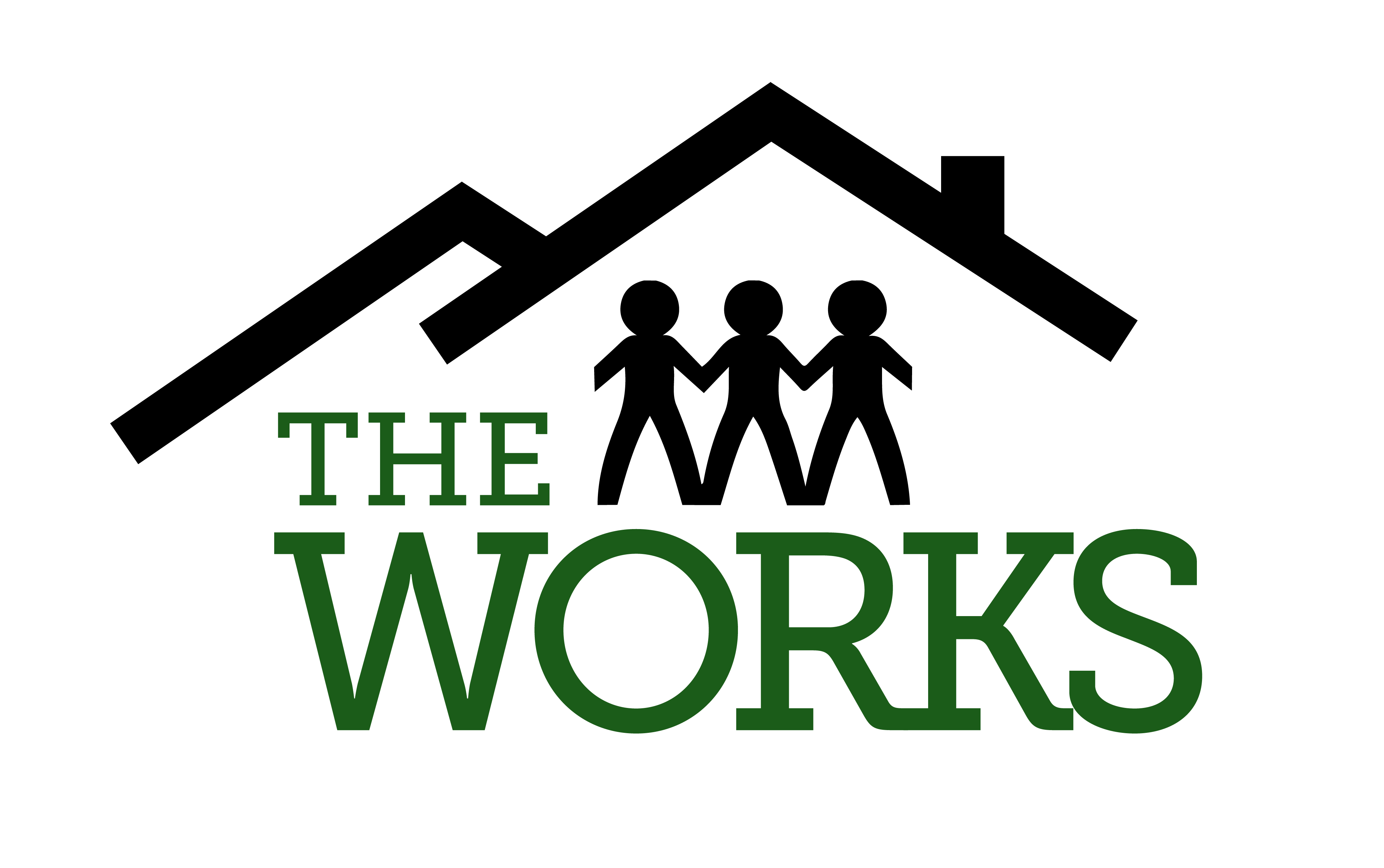Crowd Sourced City: Data Activism Edition, Fall 2023
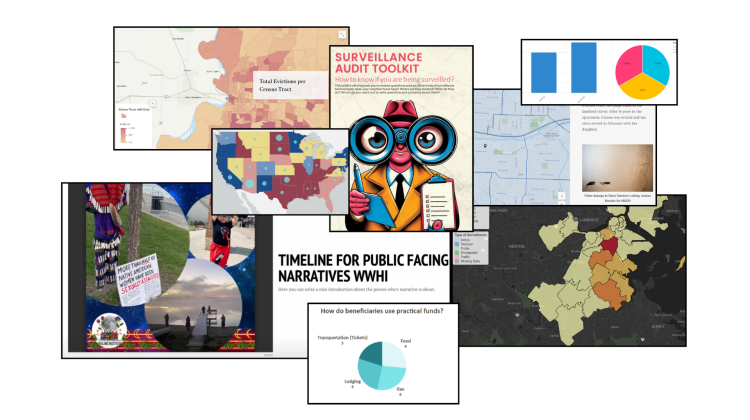
Social media networks, crowdsourcing, citizen/resident data, and mobile apps all allow us to see and understand cities and our role within them using data as a new lens. This data can be harnessed by community-based organizations in the service of activism across diverse domains such as housing, violence prevention, and environmental health. In the fall 2023 semester, a course led by DUSP’s Professor Catherine D’Ignazio explored questions such as: What is the role of data activism in social change? What are different ways that activist data and official data come into dialogue with each other? What is the role of care, emotion and historical trauma in the production of activist data?
In this ‘Data Activism’ edition of 11.458/11.138 Crowd Sourced City, students worked in groups with a partner organization to produce new data, tools, maps, or visualizations that support the organizations existing activism. Partners and topics included:
- Reproductive justice – Indigenous Women Rising, Albuquerque/National
- Tenants Rights – The Works, Memphis, TN
- Surveillance infrastructure mapping – City of Boston Mayor's Office of New Urban Mechanics
- Missing and Murdered Indigenous Women and People (MMIW/MMIP) – Waking Women Healing Institute, Menominee Lands/Wisconsin
Below is more information about each partner and the final projects that students presented.
Indigenous Women Rising (IWR)
Website: iwrising.org, IG: @indigenouswomenrising, Twitter: @IWRising
Indigenous people have been uniquely affected by the reversal of Roe vs. Wade. States with some of the largest Indigenous populations being situated in states with the strictest abortion bans, e.g. North and South Dakota, Oklahoma (where the Cherokee Nation is located). IWR is an abortion fund that focuses on indigenous persons who are seeking abortions or birth care, and that provides them with direct financial support to access these services. They are “committed to honoring Native & Indigenous People’s inherent right to equitable and culturally safe health options through accessible health education, resources and advocacy.”
Students helped IWR develop a) an internal dashboard on Tableau for visualizing summary statistics of the populations they are serving and b) a public-facing ArcGIS Storymap that shows the geographic distribution of services provided by IWR over time, embedded within the context of a rapidly changing landscape of access to reproductive health.
A selection of images from the student project with IWR
- Image
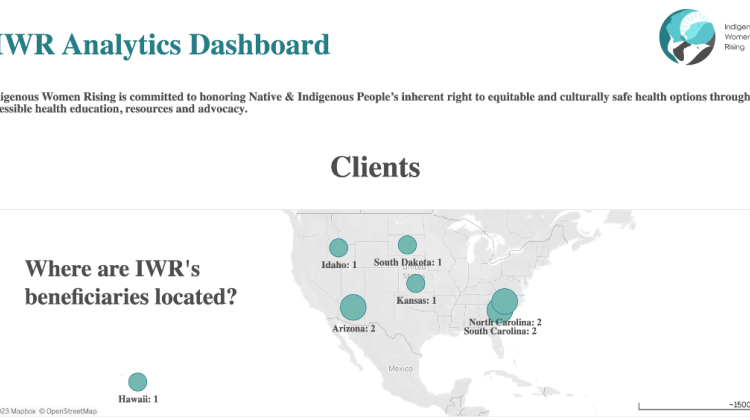
Tableau dashboard for internal monitoring and reports of relevant analytics for IWR services and operations
- Image
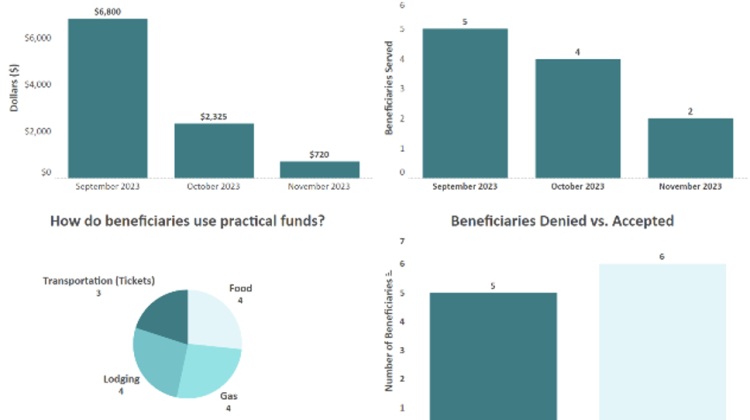
Tableau dashboard visualizations of relevant analytics for IWR services and operations
- Image
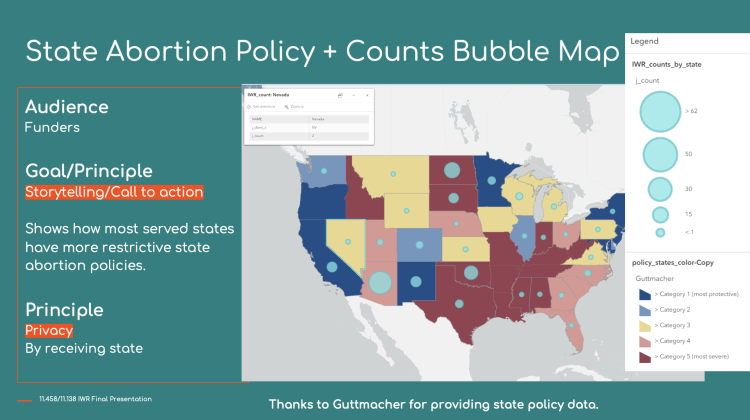 Map shows how the states most served by IWR abortion care services also have the most restrictive state abortion policies (as denoted by the
Map shows how the states most served by IWR abortion care services also have the most restrictive state abortion policies (as denoted by the - Image
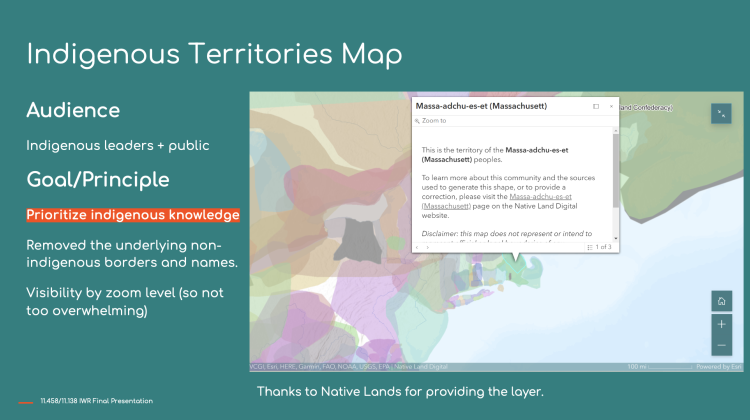 Optional basemap Layer visualizing Indigenous Territories rather than colonial borders and names
Optional basemap Layer visualizing Indigenous Territories rather than colonial borders and names
The Works
Website: theworkscdc.org , IG: @theworksinc_memphis
In Memphis Tennessee, there are few protections for tenants and many tenants do not have representation which contributes to a tenuous landscape with an eviction rate that has increased in recent years. The Works was founded in 1998 to serve housing and community development needs of South Memphis by providing social services, advocacy, and support for families’ holistic, healthful, and socioeconomic success.
Students develop maps and data visualizations to a) identify eviction hotspots and code violation hot spots, b) identify serial evictors in Memphis and c) elevate community stories about eviction.
A selection of images from the student project with The Works
- Image
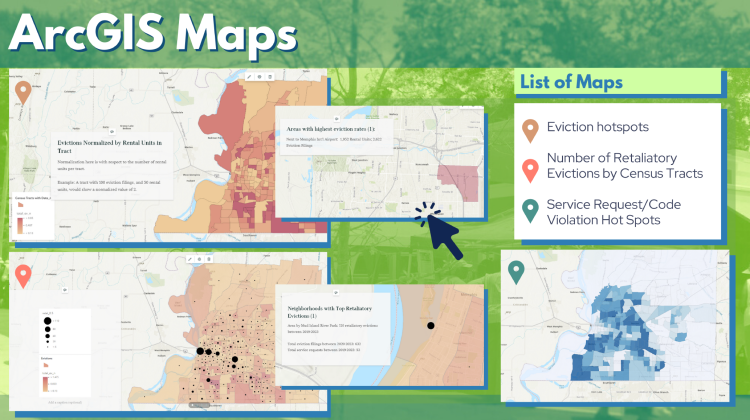 ArcGIS maps of evictions, retaliatory evictions, and code violations in Memphis Tennessee by Census Tract.
ArcGIS maps of evictions, retaliatory evictions, and code violations in Memphis Tennessee by Census Tract. - Image
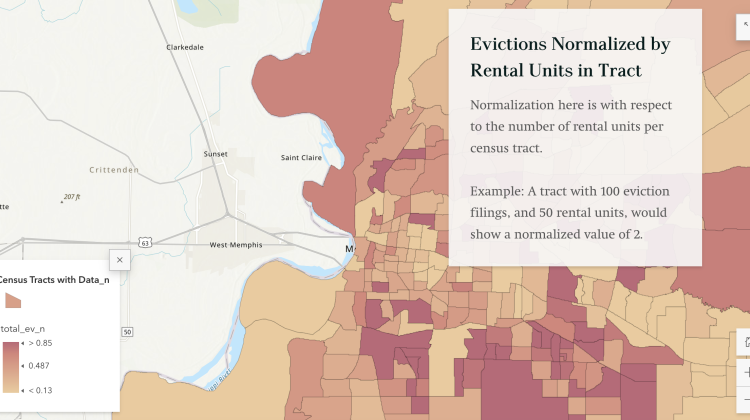 Screenshot of storymap showing evictions normalized by rental units in census tracts of Memphis, Tennessee.
Screenshot of storymap showing evictions normalized by rental units in census tracts of Memphis, Tennessee. - Image
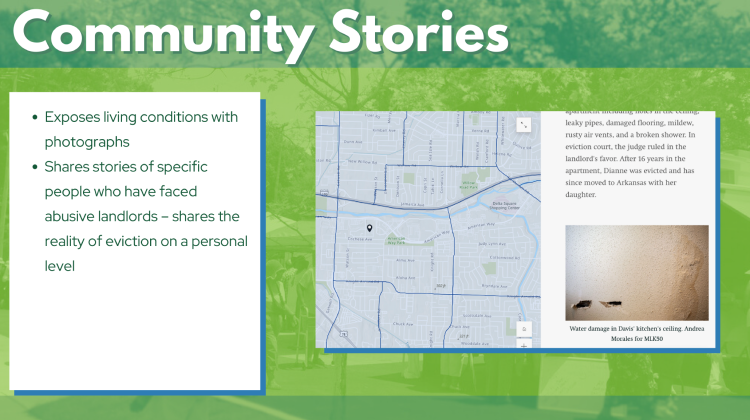 Screenshot of storymap showing stories of people who have experienced poor living conditions and abusive landlordsImage
Screenshot of storymap showing stories of people who have experienced poor living conditions and abusive landlordsImage
- Image
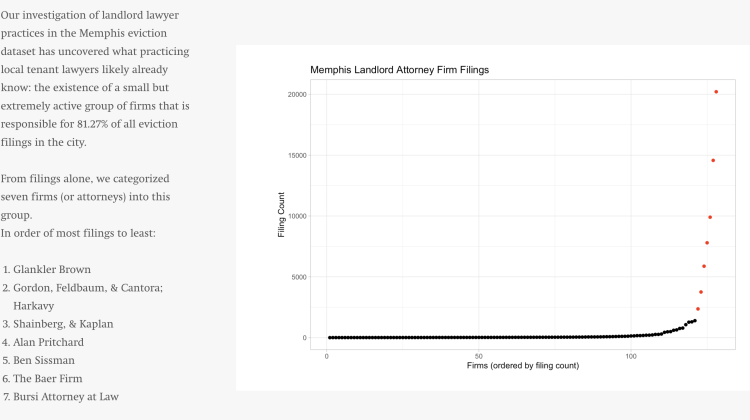 Data Analysis of Firms/Attorneys that file eviction cases shows the existence of a small but extremely active group of firms that is responsible for 81.27% of all eviction filings in the cityImage
Data Analysis of Firms/Attorneys that file eviction cases shows the existence of a small but extremely active group of firms that is responsible for 81.27% of all eviction filings in the cityImage
City of Boston Mayors's Office of New Urban Mechanics, MONUM
Website: www.boston.gov/departments/new-urban-mechanics , IG: @newurbanmechanics, Twitter: @newurbanmechs
In 2021, the City of Boston passed the ORDINANCE ON SURVEILLANCE OVERSIGHT AND
INFORMATION in response to public calls for transparency about the impact of surveillance
technology on citizens. A byproduct of this ordinance was to develop channels for dialogue around surveillance technology in Boston. MONUM, created in 2010 to experiment with, and evaluate new approaches to government and civic life, was tasked with leading these engagement efforts.
Students worked with MONUM to develop a) data visualizations of how surveillance impacts different demographic groups in Boston, b) an audit to collect new data on the location of surveillance technologies, and c) a framework for equitably engaging with local communities to solicit feedback on the use of surveillance technology in Boston.
A selection of images from the student project with MONUM
- Image
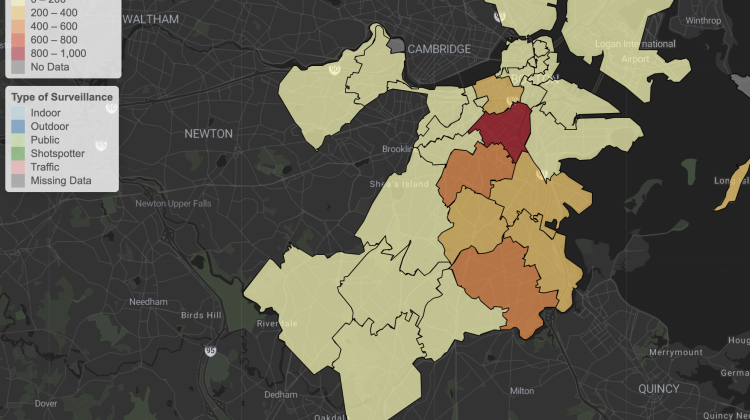 "Ob-serve", R Shiny App dashboard designed as a “one stop shop” for the public to access and engage with surveillance information in Boston. Link to
"Ob-serve", R Shiny App dashboard designed as a “one stop shop” for the public to access and engage with surveillance information in Boston. Link to - Image
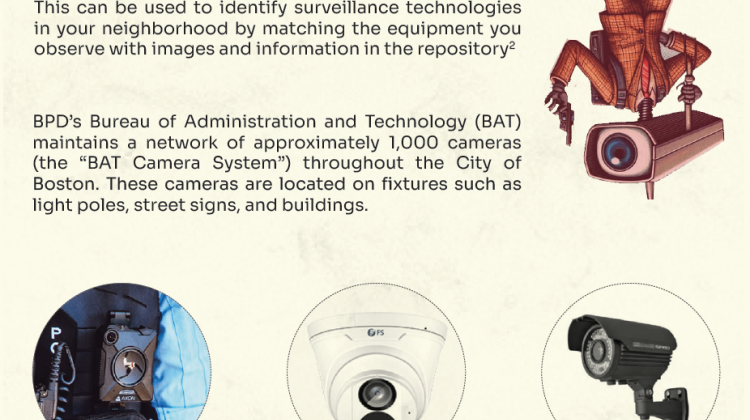 Screenshot from Zine showcases a surveillance repository showing the surveillance technologies in Boston with more information on the QR code.Image
Screenshot from Zine showcases a surveillance repository showing the surveillance technologies in Boston with more information on the QR code.Image
- Image
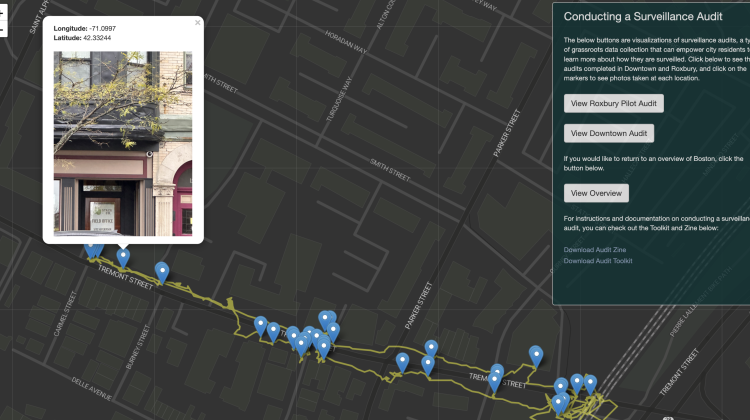 Screenshot from "Ob-serve" visualizing example surveillance audit conducted in Roxbury, MA. Link toScreenshot from "Ob-serve" visualizing example surveillance audit conducted in Roxbury, MA
Screenshot from "Ob-serve" visualizing example surveillance audit conducted in Roxbury, MA. Link toScreenshot from "Ob-serve" visualizing example surveillance audit conducted in Roxbury, MA - Image
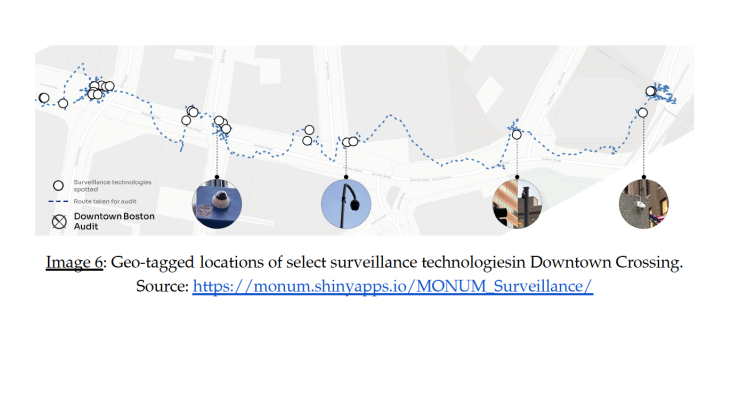
Screenshot from "Ob-serve" visualizing example surveillance audit conducted in Downtown Crossing in Boston
Waking Women Healing Institute, WWHI

Website: www.wakingwomenhealingint.org , IG: wakingwomenhealingint, Twitter: @WomenWaking
For decades, there has been an ongoing crisis of indigenous women and people being taken or murdered at an unrelenting rate, often referred to as Missing and Murdered Indigenous Women and/or People (MMIW/MMIP). WWHI is a grassroots, Indigenous-led organization based on Menominee lands in what we colonially refer to as Wisconsin. WWHI works to address the misrepresentation and disavowal of violence on indigenous bodies and land through a range of cultural practices and data activism.
Students worked with WWHI to develop a) an airtable database for documenting and summarizing cases of MMWI/P and b) a timeline data visualization for use by families to organize stories and key events related to cases of MMWI/P.
Below is a screen grab of an example, anonymized, timeline data visualization.
A selection of images from the student project with WWHI
- Image
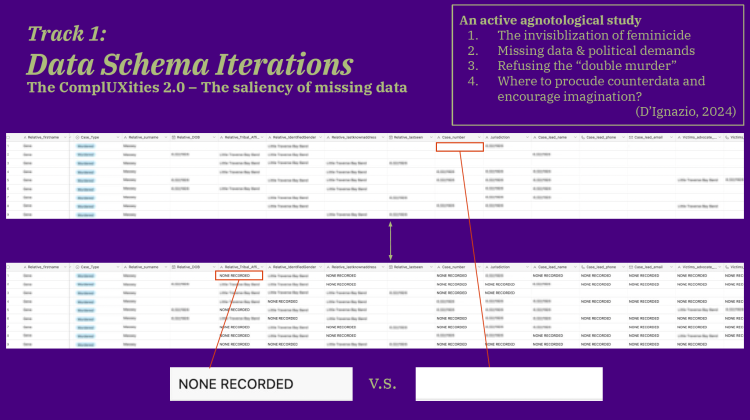
Airtable database for story gathering/case documentation of MMIW/MMIP
- Image
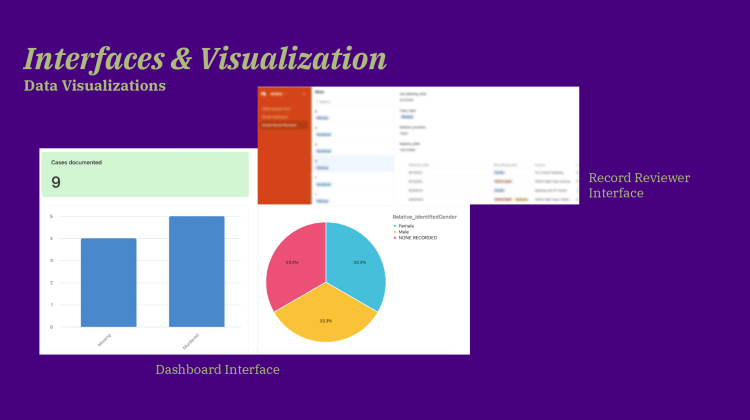
Airtable visualizations of story gathering/case documentation of MMIW/MMIP
Related Publications
The Alternative Epistemologies of Data Activism
Authors: Stefania Milan and Lonneke van der Velden
'As datafication progressively invades all spheres of contemporary society, citizens grow increasingly aware of the critical role of information as the new fabric of social life. This awareness triggers new forms of civic engagement and political action that we term “data activism”. The article argues that data activism supports the emergence of novel epistemic cultures within the realm of civil society, making sense of data as a way of knowing the world and turning it into a point of intervention and generation of data countercultures.'
See Full Text here
Counting Feminicide: Data Feminism in Action
Author: Catherine D'Ignazio
'What isn't counted doesn't count. And mainstream institutions systematically fail to account for feminicide, the gender-related killing of women and girls, including cisgender and transgender women. Against this failure, Counting Feminicide brings to the fore the work of data activists across the Americas who are documenting such murders—and challenging the reigning logic of data science by centering care, memory, and justice in their work. Drawing on Data Against Feminicide, a large-scale collaborative research project, Catherine D'Ignazio describes the creative, intellectual, and emotional labor of feminicide data activists who are at the forefront of a data ethics that rigorously and consistently takes power and people into account.'
See open access book in press in 2024
Indigenous Data Sovereignty and Policy
Edited by: Maggie Walter, Tahu Kukutai, Stephanie Russo Carroll, Desi Rodriguez-Lonebear
'This book examines how Indigenous Peoples around the world are demanding greater data sovereignty, and challenging the ways in which governments have historically used Indigenous data to develop policies and programs. At the heart of Indigenous Peoples’ demands for change are the enduring aspirations of self-determination over their institutions, resources, knowledge and information systems.'
See Open Access book here




